Case title – Patel Dharmeshbhai Naranbhai vs Dharmendrabhai Pravinbhai Fofani
The bench of justice N V Anjaria, while deciding PIL petitions preferred by the various meat vendors and associations in Gujarat who challenged the closure of their establishments/shops by government officials due to noncompliance with food safety laws, selling meat in unhygienic conditions, or doing so through unlicensed shops observed that the right to free trade in food like meat or any such food has to be subserving to the public health and food safety requirements while holding that the right to safe food is a fundamental right under Article 21 of the Indian Constitution.
The Gujarat High Court had, in a PIL plea seeking a ban on illegal and unlicenced slaughterhouses and meat shops in the state, earlier directed the civic body authorities to act against such shops, meat sellers, and slaughterhouses who are operating in violation of statutory laws.
Following the order of the HC, the civic body authorities had sealed and ordered for closure of such shops affecting meat vendors, shop associations, and owners prompting them to move to the HC as a party in the PIL plea as being aggrieved parties.
In essence, the 21 petitioners sought for a decree to open the seals of chicken meat stores in Surat. Other petitions were also filed, asking for similar directions for reopening the premises or shops or slaughterhouses of the members of the applicant association engaged in the slaughtering of small animals such as goats and sheep and further to permit to sell the mutton.
Some petitioners pleaded that if unstamped meat is being sold in some stores, the Stand and state authorities have failed in its statutory obligations to provide slaughterhouses. It was also submitted that therefore, no fault could be found with the persons engaged in slaughtering the animals and selling meat. They said that there was no suitable system in place for managing the business of selling meat and caring for the meats. Importantly, it was their uniform argument that the closure of meat shops was illegal and amounts to deprivation and curtailment of their right to free trade under Article 19(1)(g) of the Constitution. It was also submitted that the month of Ramadan is underway, therefore, the State should liberally act to redress the grievance of the applicants to permit them to sell the meat by allowing the opening of the shops.
However, rejecting their arguments, the Court in no uncertain terms held that for such shops to continue running, they have to comply with the applicable laws.
The High Court further stated in its ruling that consumers of all foods, including meat and meat products, have a right to safe food and that this right is concurrent with Article 21 of the Constitution, just as the right to food itself. Accordingly the court stated that the meat dealers cannot insist on conducting business regardless of whether the meat is unstamped or the slaughterhouse is not licensed or the norms compliant.
The Court stated that although the right to free trade may be a fundamental freedom, it does not come with a free pass and that meat vendors and slaughterhouses must abide by the provisions of the Food Safety and Standards Act, 2006, and the Food Safety Regulations as these laws are enacted and operate in the public good and public interest.
The Court also pointed out that the aforementioned laws, along with others that aim to protect animals from cruelty and cruel acts, pollution, and environmental laws, are all limiting factors that will function as reasonable restraints on the right of meat vendors and slaughterhouse owners to conduct their businesses.
Importantly the Court made the particular observation that when meat vendors are otherwise in violation of legal requirements, they cannot claim unrestricted freedom to conduct to do business in or operate slaughterhouses on the ground of religious occasions
However, the Court permitted the owners of closed meat markets, butcher shops, and slaughterhouses to approach the appropriate committee or authority and demonstrate that they have ensured compliance with all applicable laws and regulations. If the appropriate committee or authority is satisfied that they have done so, they will be permitted to reopen their markets or slaughterhouses.


